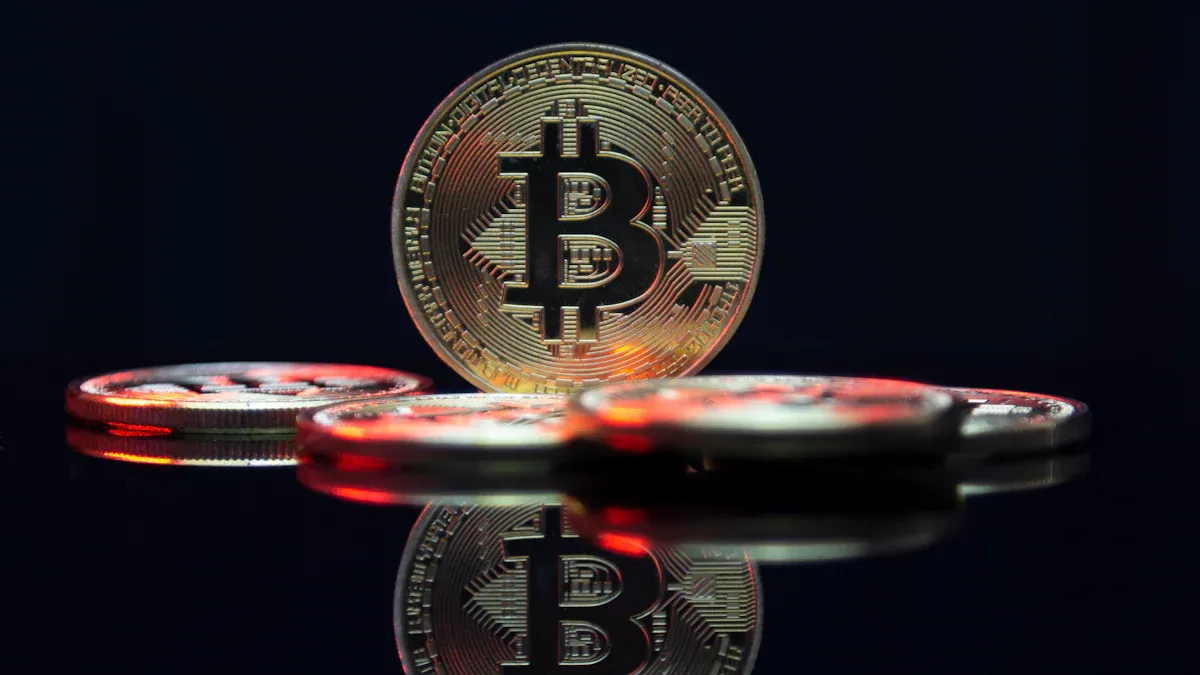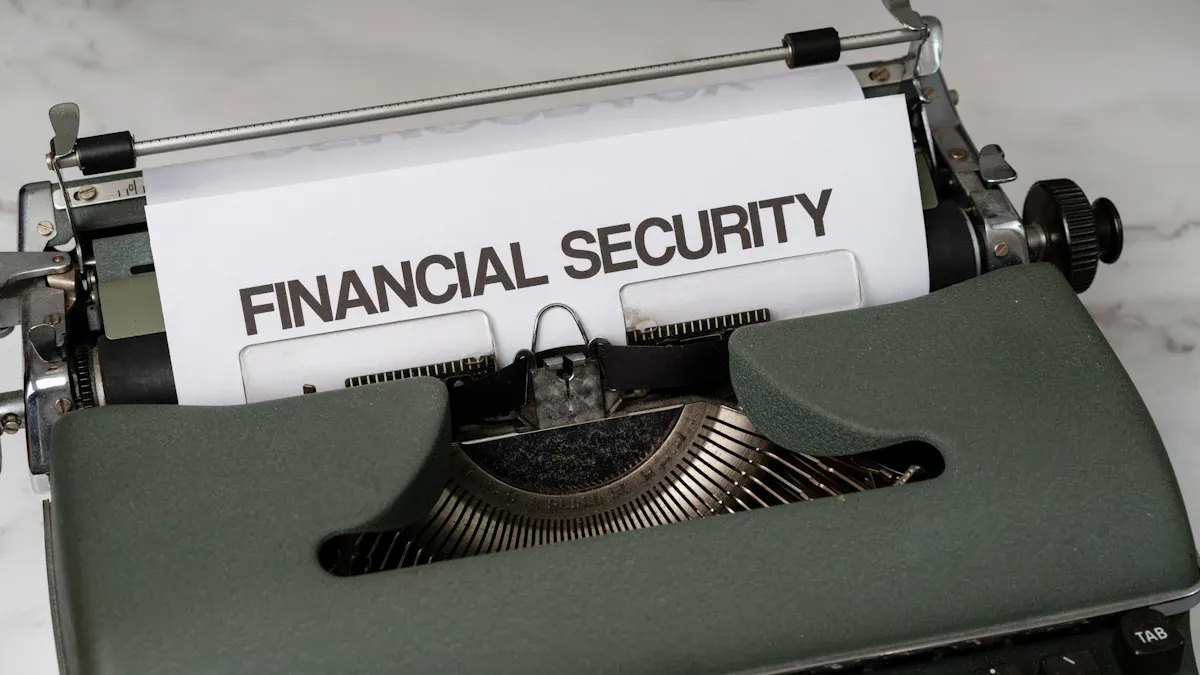- EasyCard
- Trade
- Help
- Announcement
- Academy
- SWIFT Code
- Iban Number
- Referral
- Customer Service
- Blog
- Creator
Mastering Secure and Private Methods: How to Receive Money Anonymously More Reliably?

Image Source: unsplash
Your concerns about financial privacy are not unique. Over half of Gen Z consumers say privacy is the reason they stick with cash. This concern is entirely reasonable because account abuse and data theft are the preferred methods of cybercriminals.
Shocking Data
- In 2023, there were over 3,200 data breaches in the United States alone.
- In the same year, online fraud caused losses of up to $12.5 billion.
To achieve reliable anonymous receipt of payments, the most reliable way currently is to combine strong privacy cryptocurrencies (such as Monero) with privacy protection tools (such as Tor). But remember, anonymity is not once-and-for-all; any operational mistake can lead to your identity being exposed.
Key Points
- Using Monero and privacy tools, you can receive payments anonymously more reliably.
- Monero protects your transaction privacy by default, while Zcash offers optional privacy mode.
- Bitcoin transactions are public; you need to use new addresses and mixing services to increase anonymity.
- Choosing a non-custodial wallet, using Tor or VPN, and isolating devices can protect your identity.
- Be vigilant against social engineering attacks and do not trust any service that requires you to provide private keys.
Cryptocurrencies: Advanced Anonymous Receipt Solutions

Image Source: unsplash
If you seek the highest level of privacy protection, cryptocurrencies are currently the most powerful tools. Unlike traditional financial systems, certain cryptocurrencies are designed from the ground up to protect user privacy. However, not all cryptocurrencies are created equal. You need to understand different types of cryptocurrencies and their correct usage to truly achieve security.
Privacy Coins: Monero and Zcash
Privacy coins are cryptocurrencies specifically designed for anonymous transactions. They have built-in privacy technologies at the protocol level, hiding the sender, receiver, and amount of transactions by default. Among them, Monero (Monero) and Zcash are the two most mainstream choices.
Monero (Monero, XMR): Powerful Privacy Enabled by Default
Monero forces all transactions to be anonymous; you do not need any additional settings. It protects your privacy through the following core technologies:
- Ring Signatures: This technology mixes your transaction signature with signatures from other users on the network. External observers cannot determine which participant initiated the transaction, just like being unable to tell who spoke in a group.
- Stealth Addresses: When you receive payments, Monero automatically generates a one-time public address for this transaction. Even if the payer knows your main wallet address, they cannot see where the funds go on the blockchain or view your transaction history.
- Ring Confidential Transactions (RingCT): Since 2017, Monero has hidden all transaction amounts through this technology. It uses a zero-knowledge proof called “Bulletproofs” to verify the validity of transactions (ensuring no coins are created out of thin air) without revealing the specific amounts.
Zcash (ZEC): Optional Privacy Mode
Zcash provides two types of transactions: transparent transactions and private transactions.
- Transparent Addresses (t-addresses): Function similar to Bitcoin addresses, with transaction information fully public on the blockchain.
- Shielded Addresses (z-addresses): Provide complete privacy protection. It uses an advanced encryption technology called zk-SNARKs (zero-knowledge succinct non-interactive arguments of knowledge) to prove to the network that a transaction is valid without revealing the sender, receiver, or transaction amount.
⚠️ Privacy Is Not Absolute
Although privacy coin technology is powerful, it is not untraceable. In 2024, the Finnish National Bureau of Investigation successfully traced Monero transactions related to a certain hacker and used them as court evidence. Blockchain analysis companies can infer user identities by analyzing metadata such as transaction frequency and fund transfer patterns.
Monero vs. Zcash: How to Choose?
Your choice depends on your trade-off between privacy and ease of use.
| Feature | Monero (Monero) | Zcash |
|---|---|---|
| Privacy Mode | Mandatory anonymity by default | Optional anonymity |
| Core Technology | Ring signatures, stealth addresses, RingCT | zk-SNARKs |
| Market Capitalization | About $6.029 billion | About $4.220 billion |
| Advantages | Simple and easy to use, all transactions private by default | Extremely strong anonymity for private transactions |
| Disadvantages | Larger transaction data size | Most users still use transparent transactions, privacy pool relatively small |
Currently, about 25% of Zcash’s supply is stored in the privacy-providing “shielded pool”. This indicates that while the use of its core privacy features is increasing, most users still do not fully adopt them for convenience.
Bitcoin: Techniques to Enhance Anonymity
Bitcoin is “pseudonymous” rather than “truly anonymous”. All its transactions are recorded on a public ledger. Although your real name is not directly linked to the wallet address, professional institutions can associate multiple addresses with the same person through transaction record analysis, ultimately revealing your identity.
Real-World Risks
A study successfully linked 125 independent users to 20 Tor hidden services, including “Silk Road,” by analyzing public Bitcoin transactions. This proves that relying solely on Bitcoin addresses cannot guarantee your anonymous security.
To use Bitcoin for more private receipt of payments, you must proactively take the following measures:
- Use a New Address for Each Receipt Address reuse is the enemy of privacy. When you reuse the same Bitcoin address for receipts, you are effectively publicizing all your financial activities to the outside world. All modern wallets support easy generation of new addresses. You should provide a brand new address for each receipt, which greatly increases the difficulty of tracking your fund flows.
- Use Mixing Services (CoinJoin) Mixing services allow multiple users to pool their Bitcoins together and then redistribute them to their respective new addresses. This process is like putting coins from different people into a bag, shaking it, and redistributing them, effectively disrupting the transaction path and severing the direct link between input and output addresses, making it difficult for outsiders to trace the original source of funds.
Secure Operation Step-by-Step Guide
With the right tools, you also need to follow strict operational procedures to protect yourself. The following are the key steps to build a reliable cryptocurrency anonymous receipt system.
Step 1: Choose and Set Up a Non-Custodial Wallet
The wallet is the gateway to managing your crypto assets. Your primary task is to choose a “non-custodial wallet”.
| Feature | Custodial Wallet | Non-Custodial Wallet |
|---|---|---|
| Private Key Control | Held by third parties like exchanges | Completely controlled by you |
| Privacy | Transactions monitored, requires KYC verification | Allows anonymous transactions, high privacy |
| Security Risk | High risk of platform being hacked | Losing private key means funds unrecoverable |
Huge Risks of Custodial Wallets
You should never store large amounts of funds long-term in custodial wallets (such as centralized exchanges). Historically, the collapse or theft of platforms like Mt. Gox (losing $450 million) and Coincheck (losing $530 million) has left countless users penniless. On these platforms, you do not truly own your money.
Choose an open-source, reputable non-custodial wallet and back up your seed phrase (recovery phrase) with pen and paper in an offline environment.
Step 2: Access the Network Through Privacy Tools
Your IP address is key information that exposes your identity. When performing any cryptocurrency-related operations (such as accessing wallets or exchanges), you should use the Tor browser or a reputable VPN to hide your real IP address.
Step 3: Securely Store or Cash Out
After receiving cryptocurrencies, you have two choices:
- Long-Term Storage: Keep funds in your non-custodial wallet, preferably in a hardware wallet isolated from daily devices.
- Cash Out to Fiat: If you need to convert cryptocurrencies to fiat like USD, avoid large centralized exchanges that require KYC. You can choose:
- Decentralized Exchanges (DEX): They do not require identity verification, allowing direct trading with other users.
- P2P Platforms: Choose KYC-free P2P (peer-to-peer) platforms like
BisqorRoboSats. On these platforms, you can trade directly with buyers and receive funds via bank transfer or other methods.
By following the above steps, you can maximize control over your funds and privacy, completing relatively secure anonymous receipts.
Traditional Tools for Anonymous Receipts
If you find the technical threshold of cryptocurrencies too high, or you only need to handle small, one-time anonymous receipts, some traditional tools can come in handy. Although these methods are not as anonymous as privacy coins, they are simple and convenient, suitable for specific scenarios.
Prepaid Cards and Gift Cards
Prepaid cards and gift cards are very popular value carriers. The key to using them for anonymous payments lies in the purchase process. You must use untraceable payment methods like cash to buy these cards in physical retail stores. Once you purchase with a bank card or online payment, the transaction record will link you to the card, and anonymity is lost.
The market for this is very large, proving its widespread acceptance.
| Metric | Value |
|---|---|
| 2024 Market Size | $3.60 trillion |
| 2034 Projected Market Size | $21.46 trillion |
| Compound Annual Growth Rate (2025-2034) | Over 19.55% |
However, when using prepaid and gift cards, you need to note two main limitations:
- Amount Limit: Most cards have a storage amount limit, usually not suitable for large transactions.
- Usage Scope: Gift cards can usually only be used at specific merchants or platforms, while prepaid cards (such as those issued by Visa or Mastercard) have broader uses but may not work for all online services.
Small-Amount Anonymity with Digital RMB
As an emerging payment method, China’s digital RMB (e-CNY) provides a “controllable anonymity” function. It follows the principle of “small amounts anonymous, large amounts traceable,” providing you with a certain degree of privacy protection.
By design, users can enjoy anonymity when using digital RMB for purchases below 2,000 RMB (about $300). This means that for small transactions, payment behavior is not directly linked to your personal identity information. However, once the transaction amount exceeds this threshold, your transaction data will be recorded and traceable to comply with anti-money laundering and other financial regulatory requirements.
Digital RMB vs. Cash: Privacy Trade-Off
The “controllable anonymity” of digital RMB cannot match the privacy provided by physical cash. The central bank has visibility into digital RMB transactions that cash does not, which is effective in combating crime but may also weaken personal financial privacy.
The table below clearly shows the core differences in privacy between the two:
| Feature/Transaction Type | Digital RMB (Controllable Anonymity) | Cash Transactions |
|---|---|---|
| Anonymity Level | Small transactions anonymous, large transactions traceable | Highly anonymous |
| Government Visibility | Central bank has visibility and control | No direct visibility |
| Identity Association | Lowest-level wallet requires phone number (real-name system) | No identity association required |
| Anti-Crime Capability | Can be used to combat crime and money laundering | Difficult to trace |
Therefore, you can view digital RMB as a payment option that is more private than traditional bank transfers but far less anonymous than cash.
Beware of “Pseudo-Anonymous” Payment Platforms
The internet is full of payment services claiming to be “anonymous,” but you must be discerning. A simple judgment criterion is: Any platform that requires you to complete KYC (Know Your Customer) identity verification is not a truly anonymous platform.
These platforms may collect your identity information under the guise of “protecting user security” or “complying with regulations,” but this also means your transaction records and personal data are centrally stored, with risks of leakage or submission to third-party institutions. Common “pseudo-anonymous” services include:
- Hybrid Crypto Debit Cards: Allow you to spend cryptocurrencies but require identity proof before issuing the card.
- Certain Payment Apps: For example, Cash App allows small transfers using nicknames ($cashtags), but once larger amounts are involved, the platform forces identity verification.
Global Regulation Is Tightening
International organizations like the Financial Action Task Force (FATF) are pushing for stricter anti-money laundering (AML) compliance standards. Starting from 2025, financial institutions are expected to be required to strengthen transparency reviews of beneficial ownership. This means the space for anonymous financial transactions is being further compressed, and anonymous methods relying on third-party services will become increasingly unreliable.
Your primary principle should be: Do not fully trust any service provider. Their primary obligation is to comply with regulations, not to protect your privacy.
Universal Security Guidelines: Preventing Identity Leakage

Image Source: unsplash
Technical tools are only part of the anonymous receipt system. Your behavioral habits are equally crucial. Any negligence can render your previous efforts useless. You must follow strict security guidelines to protect your digital identity like a fortress.
Isolate Network Environment
Your network activities leave digital footprints. To sever the link between these footprints and your real identity, you need to create an isolated network environment. An effective method is to combine virtual machines (VMs) and VPNs.
Build Your Digital “Safe House”
A virtual machine is like running another “virtual computer” inside your computer. It is an independent sandbox environment. You can install and run a VPN inside the virtual machine to provide double protection for your network activities. Even if the virtual machine is compromised, your main system remains secure.
Follow these steps to strengthen your network isolation:
- Set Up Virtual Machine: Use software like VirtualBox or VMware to create a virtual machine and install an independent operating system.
- Install VPN in Virtual Machine: Run the VPN in the virtual machine to ensure all traffic from the virtual machine is encrypted and anonymized.
- Disable Direct Access: Close channels for direct external network access to the virtual machine to prevent brute-force attacks.
Isolate Devices and Accounts
In addition to the network environment, you must isolate devices and accounts used for sensitive operations. Do not perform high-risk operations on your daily phone or computer.
For the highest level of device isolation, you can use Tails OS. This is an operating system that can be booted from a USB drive.
- Traceless Operation: Tails runs in computer memory, and all activity records are automatically erased upon shutdown.
- Forced Anonymity: It forces all network traffic through the Tor network, hiding your IP address.
- Built-In Tools: Tails comes pre-installed with encrypted wallets, password managers, and metadata cleaning tools, providing an out-of-the-box secure environment.
Prevent Social Engineering
Social engineering is the most powerful weapon of hackers. They exploit human weaknesses through deception and psychological manipulation to steal your information and assets, posing a greater threat than pure technical attacks.
Real-World Lessons
Attackers impersonate exchange customer service, project founders, or government agencies, creating urgency and fear to trick you into taking action. Be alert to the following danger signals:
- Any institution or individual unexpectedly contacts you via email or text and asks you to pay with cryptocurrency.
- Claims your account is at risk and needs you to immediately transfer assets to their provided “safe address”.
- Creates fake websites with domains extremely similar to official sites to trick you into entering private keys or seed phrases.
Remember, legitimate companies will never ask for your private key or guide you to make urgent cryptocurrency transfers. In any case, remain skeptical.
If you seek the highest level of privacy, solutions based on privacy coins like Monero are the first choice. For small, convenient needs, prepaid cards purchased anonymously can serve as a supplement. Your choice should depend on anonymity needs, technical threshold, and transaction amount. Ultimately, reliable anonymous receipt requires combining technical tools with good security habits.
Staying vigilant and proactively maintaining personal privacy is the only way to achieve reliable protection.
FAQ
Is anonymous receipt of payments legal?
The legality of anonymous receipt depends on your region and the purpose of the transaction. You must comply with local laws. Using anonymous receipt for illegal activities is clearly illegal. In uncertain cases, consulting a legal professional is wise.
Which anonymous method is the best?
There is no absolute “best” method. You need to choose based on privacy needs, amount, and technical ability. For the highest privacy, choose Monero. For handling small funds, consider prepaid cards purchased anonymously.
Can I use PayPal or similar tools for anonymous receipt?
No. These platforms require you to complete identity verification (KYC). They record your transactions and link them to your real identity, so they are not truly anonymous tools. Your privacy cannot be guaranteed.
Do I really need to use Tor or VPN?
Yes, it is very necessary. Your IP address is key information that exposes your identity. Without these tools, all your online operations can be traced to your real identity, rendering other anonymity measures ineffective.
*This article is provided for general information purposes and does not constitute legal, tax or other professional advice from BiyaPay or its subsidiaries and its affiliates, and it is not intended as a substitute for obtaining advice from a financial advisor or any other professional.
We make no representations, warranties or warranties, express or implied, as to the accuracy, completeness or timeliness of the contents of this publication.




Contact Us
Company and Team
BiyaPay Products
Customer Services
is a broker-dealer registered with the U.S. Securities and Exchange Commission (SEC) (No.: 802-127417), member of the Financial Industry Regulatory Authority (FINRA) (CRD: 325027), member of the Securities Investor Protection Corporation (SIPC), and regulated by FINRA and SEC.
registered with the US Financial Crimes Enforcement Network (FinCEN), as a Money Services Business (MSB), registration number: 31000218637349, and regulated by FinCEN.
registered as Financial Service Provider (FSP number: FSP1007221) in New Zealand, and is a member of the Financial Dispute Resolution Scheme, a New Zealand independent dispute resolution service provider.



















